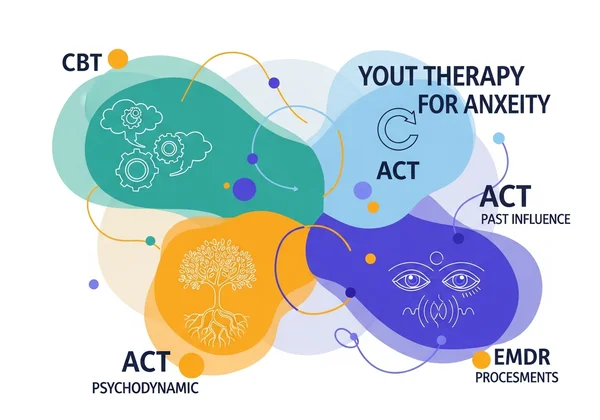After Your Anxiety Test: A Guide to Finding the Right Therapist
November 20, 2025 | By Isla Caldwell
Taking an online anxiety test is a courageous first step, but figuring out what to do with your results can feel daunting. You're not alone in feeling overwhelmed by where to start. After completing a confidential anxiety test, the next question is often: what now? This guide will demystify the process of finding an anxiety therapist, providing clear, actionable steps to connect you with a professional who understands the insights from your anxiety test and is the right fit for your unique needs. This is about empowering you on your path to a calmer, more balanced life, starting with the valuable information gained from a confidential anxiety assessment.
Understanding Your Options After an Anxiety Test: Types of Therapy
Before diving into your search, let's explore the diverse world of therapy. Not all approaches are created equal, especially when it comes to addressing the specific concerns an anxiety test might highlight. Understanding these methods can help you find a therapist who can best interpret your anxiety test results and guide you toward the most effective treatment plan.

Cognitive Behavioral Therapy (CBT) for Anxiety Explained
Cognitive Behavioral Therapy (CBT) is one of the most well-researched and effective treatments for anxiety disorders. Its core principle is that our thoughts, feelings, and behaviors are interconnected. CBT helps you identify and challenge negative thought patterns and behaviors that contribute to your anxiety. For example, a therapist might help you recognize a tendency to catastrophize (imagine the worst-case scenario) and work with you to reframe those thoughts into more realistic ones. It's a practical, goal-oriented approach that equips you with tangible coping skills to use in your daily life.
Acceptance and Commitment Therapy (ACT): What It Is and How It Helps
Acceptance and Commitment Therapy (ACT) takes a slightly different approach. Instead of trying to eliminate anxious thoughts, ACT teaches you to accept them as a natural part of the human experience without letting them control you. The goal is to reduce the struggle against these feelings, freeing you up to focus on what truly matters to you. A key part of ACT involves identifying your core values and committing to actions that align with them, even when anxiety is present. It’s a powerful method for building psychological flexibility and a meaningful life.
Other Effective Approaches: Psychodynamic, EMDR, and More
While CBT and ACT are common, they are far from the only options. Psychodynamic therapy delves into how past experiences and unresolved conflicts might be influencing your present anxiety. It aims to build self-awareness and understanding of the root causes of your feelings. Eye Movement Desensitization and Reprocessing (EMDR) is another specialized therapy, particularly effective for anxiety stemming from trauma. It uses bilateral stimulation (like eye movements) to help the brain process and integrate traumatic memories. Discussing these and other approaches with a potential therapist can help you find the best fit.
How to Find the Right Therapist: Your Practical Search Guide
With a better understanding of therapy types, you can now begin the practical search. Finding the right person is a crucial step in your mental health journey. This isn't just about finding someone with the right qualifications; it's about finding a person you can trust and connect with.

Where to Look: Reputable Online Directories & Referrals
A great place to start your search is by using reputable online directories for mental health professionals. These platforms have searchable databases that allow you to filter for licensed therapists by location, specialty, insurance, and therapy type, making it easier to find someone who fits your criteria. Don't underestimate the power of referrals, either. Your primary care doctor can often provide trusted recommendations for mental health professionals in your area who can help you process the results of an anxiety test.
Credentials for Therapists Who Understand Your Anxiety Test Results
When reviewing profiles, pay close attention to therapist credentials. Look for licensed professionals such as Licensed Professional Counselors (LPC), Licensed Clinical Social Workers (LCSW), Licensed Marriage and Family Therapists (LMFT), Psychologists (PhD, PsyD), and Psychiatrists (MD). Crucially, check if they specialize in anxiety disorders. A therapist with expertise in treating GAD, social anxiety, or panic disorder will have a deeper toolkit to help you. After taking a free anxiety test, finding a specialist who understands the nuances of your results is key to building an effective treatment plan based on your anxiety test score.
Practical Considerations: Cost, Insurance, and Availability
Therapy is an investment in your well-being, but practical factors are important. Before reaching out, determine your budget. Check if the therapist accepts your insurance or if you have out-of-network benefits you can use. Many therapists also offer sliding-scale fees based on income. Finally, consider logistics. Is their office location convenient? Do they offer online sessions (telehealth)? Ensure their availability aligns with your schedule to make attending sessions as stress-stress-free as possible.
Making the Connection: Questions for Consultations & Your First Session
You've narrowed down your list—now it's time to make contact. Most therapists offer a free, brief consultation call (around 15-20 minutes). This is your opportunity to interview them and see if it feels like a good fit. Think of it as a two-way conversation to ensure you feel comfortable moving forward.
Key Questions to Ask During an Initial Consultation
Come to the consultation prepared with a few questions. This shows you are an engaged participant in your own care. Consider asking:
- What is your experience treating people with anxiety, particularly those who have recently taken an anxiety test like the GAD-7?
- What is your therapeutic approach (e.g., CBT, ACT), and what would a typical session look like?
- What are your fees, and do you accept my insurance?
- How do you measure progress after an initial anxiety test?
Their answers will not only give you important information but also a sense of their communication style. Understanding your anxiety score from an initial anxiety test can be a great starting point for this conversation.

Recognizing a Good Fit: Red Flags and Green Lights
The connection you have with your therapist, often called the therapeutic alliance, is one of the biggest predictors of success. Green lights include feeling heard, respected, and understood. A good therapist should be empathetic, non-judgmental, and able to explain their approach clearly. Red flags might include a therapist who is dismissive, talks too much about themselves, makes promises of a "cure," or makes you feel uncomfortable in any way. Trust your gut—it's okay to keep looking if the first person you speak with doesn't feel right.
Preparing for Your First Therapy Session: What to Expect
Your first therapy session is primarily about getting to know each other. Your therapist will likely ask about your history, what brought you to therapy (you can mention the anxiety test you took), and what you hope to achieve. You don't need to have all the answers. The goal is to start building a trusting relationship. Be open and honest, but only share what you feel comfortable with. Remember, this is your time and your space to begin the healing process. It's the next logical step after you get insights now from an online anxiety test.
Disclaimer: This article is for informational purposes only and does not constitute medical advice. The tools and information on AnxietyTest.me are screening tools, not diagnostic instruments. Please consult a qualified healthcare professional for any health concerns or before making any decisions related to your health or treatment.
Taking the Brave Step: Your Path to a Calmer Self
Finding the right anxiety therapist is a journey, not a one-time event. It requires patience, research, and self-advocacy, but it is one of the most empowering actions you can take for your mental health. Starting with an anxiety test can provide valuable clarity, but partnering with a qualified professional is how you build the skills for lasting change. Each step you take, from completing your online anxiety test to your first session, is a testament to your strength and commitment to your well-being. Continue your start your journey toward understanding and managing your anxiety today.

Frequently Asked Questions About Finding an Anxiety Therapist
How do I know if I need a therapist for anxiety?
If anxiety is persistently interfering with your daily life—affecting your work, relationships, or ability to enjoy things—it's a strong sign that therapy could be beneficial. A high score on an anxiety test or experiencing physical symptoms like a racing heart, trouble sleeping, or constant worry are also indicators that professional support is a wise next step. Discussing the results of your online test with a therapist is the best way to get a clear path forward.
What's the difference between a psychologist and a psychiatrist?
A psychologist typically has a doctoral degree (PhD or PsyD) and provides psychotherapy (talk therapy). A psychiatrist is a medical doctor (MD) who can also provide therapy but is uniquely qualified to prescribe medication. Often, they work together to provide comprehensive care.
Can I find affordable anxiety therapy options?
Yes, there are many avenues for affordable care. Look for therapists who offer a sliding-scale fee based on your income. University counseling centers often provide low-cost services from therapists-in-training. Additionally, community mental health clinics and non-profit organizations are excellent resources for accessible therapy.
What if I don't "click" with my first therapist?
It is completely normal and acceptable to not feel a connection with the first therapist you meet. The therapeutic relationship is key, and finding the right fit is essential. Don't be discouraged. It's okay to inform the therapist that it doesn't feel like the right match and continue your search.
How long does anxiety therapy typically last?
The duration of therapy varies greatly depending on the individual, the severity of the anxiety (which your anxiety test may have indicated), and the therapeutic approach. Short-term, solution-focused therapies like CBT might last for 12-20 sessions, while more in-depth approaches like psychodynamic therapy can be longer-term. This is an excellent question to discuss with a potential therapist during your initial consultation, using your anxiety test results as a reference point.